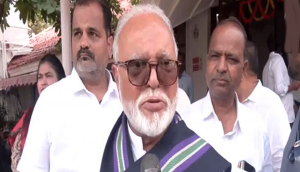Gandhis in trouble: how do the arguments stack up in the National Herald case

Several political careers hinge on the National Herald case. For the Gandhis, it is a matter of survival. Subramanian Swamy is looking for his pound of flesh. Then there are several Congress leaders who are trying to revive their own careers by jumping to the defence of their leadership.
It is too early to declare the likely winner of this case. After all Congress hasn't filed its detailed response, clarifying the source and nature of funds that it has transferred. But since the case is only getting more interesting by the day, we can surely weigh in on the legal arguments on either side.
Also read - You may dislike the National Herald deal. That doesn't make it criminal: Salman Khurshid
The case
-
National Herald was a newspaper owned and published by Associated Journals Limited (AJL).
-
NH was started under the chairmanship of Jawaharlal Nehru in 1938 and closed down in 2008.
-
AJL owns properties worth more than Rs 2,000 crore.
-
AJL has 1,057 shareholders who contributed Rs 89 lakh on its inception.
-
In 2008, AJL shut down National Herald citing mounting losses of Rs 90.25 crore.
AJL has assets worth Rs 2000 crore and 1057 shareholders who contributed Rs 89 lakh on its inception
-
Congress offered to pay this loan. Meanwhile Sonia Gandhi and Rahul Gandhi floated a non-profit company called Young Indian with a capital of Rs 5 lakh.
-
AJL declared it couldn't repay Congress the required loan. That's where YI came in taking responsibility of the loan amount, and paid AJL Rs 50 lakh over and above, and took control over the company.
-
Congress decided to waive off the loan, effectively letting YI, with a worth of Rs 5 lakh, take over AJL, worth more than Rs 2,000 crore.
-
Notably, Motilal Vohra was the Congress treasurer, member of AJL's board of director and shareholder in YI, at that time.
Arguments against Congress
-
AJL could have cleared the debt of Rs 90.25 crore that it was under, by selling a portion of its Rs 2,000 crore assets.
-
It need not have taken loan from a political party and then surrender most of its shares to YI. By issuing 99% of its shares to YI, as it did, it caused shareholders of YI a loss of 99% of Rs 2,000 crore or Rs 1980 crore.
-
Congress could have recovered the loan of Rs 90.25 crore they gave to AJL, but they chose not to. By deciding to waive off Rs 90.25 crore as a bad debt, it suffered a loss of Rs 90.25 crore. Why?
-
One could accuse the Congress of raising funds in a completely clandestine manner, helping YI, or itself, take backdoor control of assets worth Rs 2,000 crore.
-
Congress' argument that Subramanian Swamy is not a shareholder in either AJL or YI and therefore does not have a locus standi, is not legally tenable, as the High Court which found prima facie evidence of fraud has shown.
-
As Supreme Court has already ruled, the concept of "locus" is alien to criminal law and anyone can set the criminal machinery in motion.
-
Subramanian Swamy has basically leveled 3 charges against Sonia Gandhi, Rahul Gandhi and 5 others - criminal misappropriation (under section 403), criminal breach of trust (section 406) and cheating (420).
Congress argues there is no conflict of interest since all the transactions were within the party
-
Provisions of Section 403, which entail 3 years' jail or fine or both, could be slapped against the 7 accused on the argument that Congress violated Representation of People's Act and the Constitution of the Congress Party by offering loan to a public company, since donations to it were made only with the intentions of advancement of democracy.
-
Also, no efforts were made by Congress to recover the loan.
-
The other two sections could also be raised against the seven accused on the argument that Congress basically created a sham company with YI, which doesn't seem to have any objective, to takeover the assets of AJL.
-
Sections of the Companies Act could also be raised, but by shareholders of AJL only, to point to the losses they suffered due to unfair practices since the persons in-charge at AJL, YI and Congress were the same.
-
Finally, nothing stops Congress or YI from converting their terms of licence from a non-profit to a for-profit company and enjoying direct benefits of the Rs 2,000 assets.
Arguments in favour of the Congress
-
Congress' primary argument in the case is that nobody has profited from the transfer of assets, so there is no case of criminal misappropriation or cheating.
-
The argument is that since Young Indian, the entity started by Sonia Gandhi and Rahul Gandhi that took over Rs 2,000 crore worth of AJL's properties, is a non-profit company, Sonia and Rahul Gandhi are prohibited from drawing any benefits from AJL's assets.
-
Another argument is that there is no conflict of interest since YI was comprised of Congress members, AJL had mostly Congress shareholders, all the transfer of funds happened within Congress, so who lost what?
-
There is no law expressly forbidding a political party from investing in a public company. So Congress offering loan to AJL isn't illegal.
-
Congress or YI has taken over AJL only to revive National Herald. That they are just biding time before putting systems at AJL back at place and thus helping a publishing entity find its feet again, gaining nothing in the process.
-
None of the shareholders objected with the board of directors at AJL decided to transfer shares to YI.
-
There is no evidence to prove that YI or Sonia or Rahul Gandhi have earned anything from the transfer of properties. All the rent that AJL earn by renting out their properties goes to AJL and not to YI.
MORE IN CATCH - National Herald case: where did the Gandhis go wrong?
The #COP21 Deal: And why we will be talking about it for the next 15 years
Happy 100th, Frank Sinatra: 10 incredible songs to celebrate with







![BJP's Kapil Mishra recreates Shankar Mahadevan’s ‘Breathless’ song to highlight Delhi pollution [WATCH] BJP's Kapil Mishra recreates Shankar Mahadevan’s ‘Breathless’ song to highlight Delhi pollution [WATCH]](https://images.catchnews.com/upload/2022/11/03/kapil-mishra_240884_300x172.png)

![Anupam Kher shares pictures of his toned body on 67th birthday [MUST SEE] Anupam Kher shares pictures of his toned body on 67th birthday [MUST SEE]](https://images.catchnews.com/upload/2022/03/07/Anupam_kher_231145_300x172.jpg)






